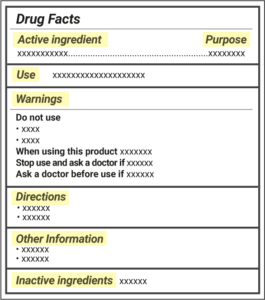

What do your aspirin, cough syrup, and seasonal allergy treatments have in common? They are all examples of over-the-counter (OTC) medicines – and that means that they all have a Drug Facts label on their packaging. You’ve probably seen this label many times before: it’s been the FDA-required standard for OTC product labeling for almost twenty years. The Drug Facts label helps to provide the essential information about an OTC medicine in an easy-to-read and easy-to-understand, uniform format.
Before taking any medicine (whether it’s prescription or OTC) it’s critically important to read the label. Reading the label can help you to understand the amount to take, how to take it, and provides any warnings. The Drug Facts label contains the following sections to help you to understand the critical information you need to know about your OTC medicine:

The OTC Drug Facts Label
Reading the label before taking any medicine is critical: it can help you to take the correct dose, recognize side effects, and understand when to speak with your pharmacist or doctor. Your medicine’s label and packaging are also helpful resources for understanding proper storage conditions – and even how long you can store the product before disposing of it properly.
Your OTC product’s expiration date isn’t included on the Drug Facts label but can typically be found printed on the outer packaging, or directly on the bottle or blister pack of the medicine. The FDA recommends not to use your medicine when it’s past the expiration date, as there is no guarantee that it will be effective or even safe to take. You should always check the expiration date before taking medicine, and dispose of it securely and promptly once it’s expired or no longer needed.
—
Due to possible disruptions associated with COVID-19, kiosk access to and operating hours at the listed kiosk locations may be impacted. If you have questions about a kiosk site, including current kiosk access, what can be disposed of, and hours of operation, contact the kiosk site directly. If you are not able to visit a kiosk and have immediate disposal needs, visit the FDA website for additional guidance and be sure to comply with all applicable federal, state, and local legal requirements.

Can't make it to a kiosk site or take back event? ~ You’ve taken the steps needed to spring clean…
Read More
Before you leave the house... ~ In response to the COVID-19 pandemic, events have been canceled and postponed indefinitely across…
Read More
Prescription Medication Guides ~ It’s important to read the label of any medicine before use – but what about the…
Read More
Your pharmacist is an important member of your healthcare team ~ A critical member of your healthcare team may be…
Read More